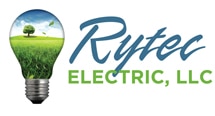Understanding Electrical Hazards in the Home
It’s easy to forget that just 100 years ago electricity in homes was a novel concept and still quite dangerous. Over the last century, safety features have improved and we’ve now reached a point where we can be forgiven for assuming that electricity is perfectly safe.
However, in order to be safe around electricity it is essential to understand the risks associated with it, as well as be able to identify the common electrical hazards present in our homes. Electricity still causes over 50,000 home fires per year, leading to 500 deaths and thousands of injuries. Unfortunately many of these accidents could have been avoided, either avoiding dangerous situations or through detecting problems early with a routine electrical inspection.
This article will examine the most common electrical hazards we face in our homes and offer some guidance on staying safe.
What Constitutes an Electrical Hazard
The first danger of electricity that most people think of is electrical shocks, but modern product safety standards have made this phenomenon increasingly uncommon. For anyone doing DIY work on their wiring system the risks are significantly higher, and these projects should only be undertaken by people who are knowledgeable about the risks and proper safety procedures. However, on a day-to-day basis, shocks are quite rare.
The biggest danger of electricity is fire. Electrical fires destroy over a billion dollars in homes each year and claim hundreds of lives. Sadly, many of these fires could have been prevented with a home inspection along with a better understanding of home electrical safety.
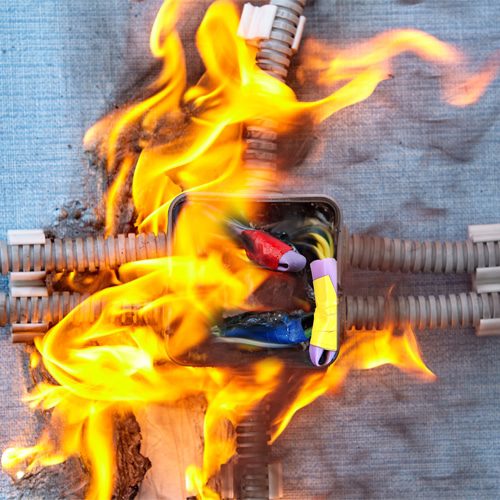
Common Electrical Hazards in the Home
Outdated Wiring
Older homes may not be equipped to handle the electrical load of modern appliances, leading to a greater risk of electrical fires. Outdated wiring materials like knob-and-tube or aluminum wiring can deteriorate over time, becoming fire hazards.
If you live in an older home, it is important to have a professional assess your wiring and upgrade your electrical system if necessary.
Overloaded Circuits
All circuits have a load rating measured in amps. Exceeding this rating causes the wires to overheat, potentially leading to an electrical fire. Signs of an overloaded circuit include flickering lights, warm or buzzing outlets, and frequent tripping of circuit breakers.
If you notice any of these signs, unplug some devices and consult an electrician to help redistribute the electrical load safely.
Faulty or Damaged Wiring
Damaged wiring can result from various factors like aging, rodent damage, or physical wear and tear. Signs include frayed wires, discoloration around outlets, and a burning or fishy smell near electrical outlets and fixtures.
If you believe you have faulty wiring, discontinue use of the affected outlets and immediately contact a qualified electrician to prevent the risk of fire or electrocution.
Misuse of Extension Cords
Extension cords are incredibly convenient, but also are very easy to misuse! Over 3000 home fires are caused each year by these cords – and likely could have been avoided by following these tips:
Proper use of extension cords:
- Check the Rating: Make sure the extension cord is rated for the total wattage of the devices you’ll be plugging into it.
- Fully Unravel: Always fully unravel the cord to prevent it from overheating.
- Inspect for Damage: Before each use, check the cord for any signs of fraying, cracking, or exposed wires.
- Plug Into Grounded Outlets: Use three-prong, grounded extension cords and plug them into grounded outlets whenever possible.
- Use for Temporary Needs: Extension cords should be used for temporary power needs and not as a long-term or permanent electrical solution.
- Keep Dry: Make sure the cord is kept away from water to prevent electric shock or short-circuits.
- Secure the Cord: Keep the extension cord flat on the ground to avoid tripping hazards, and never run it under rugs or through walls.
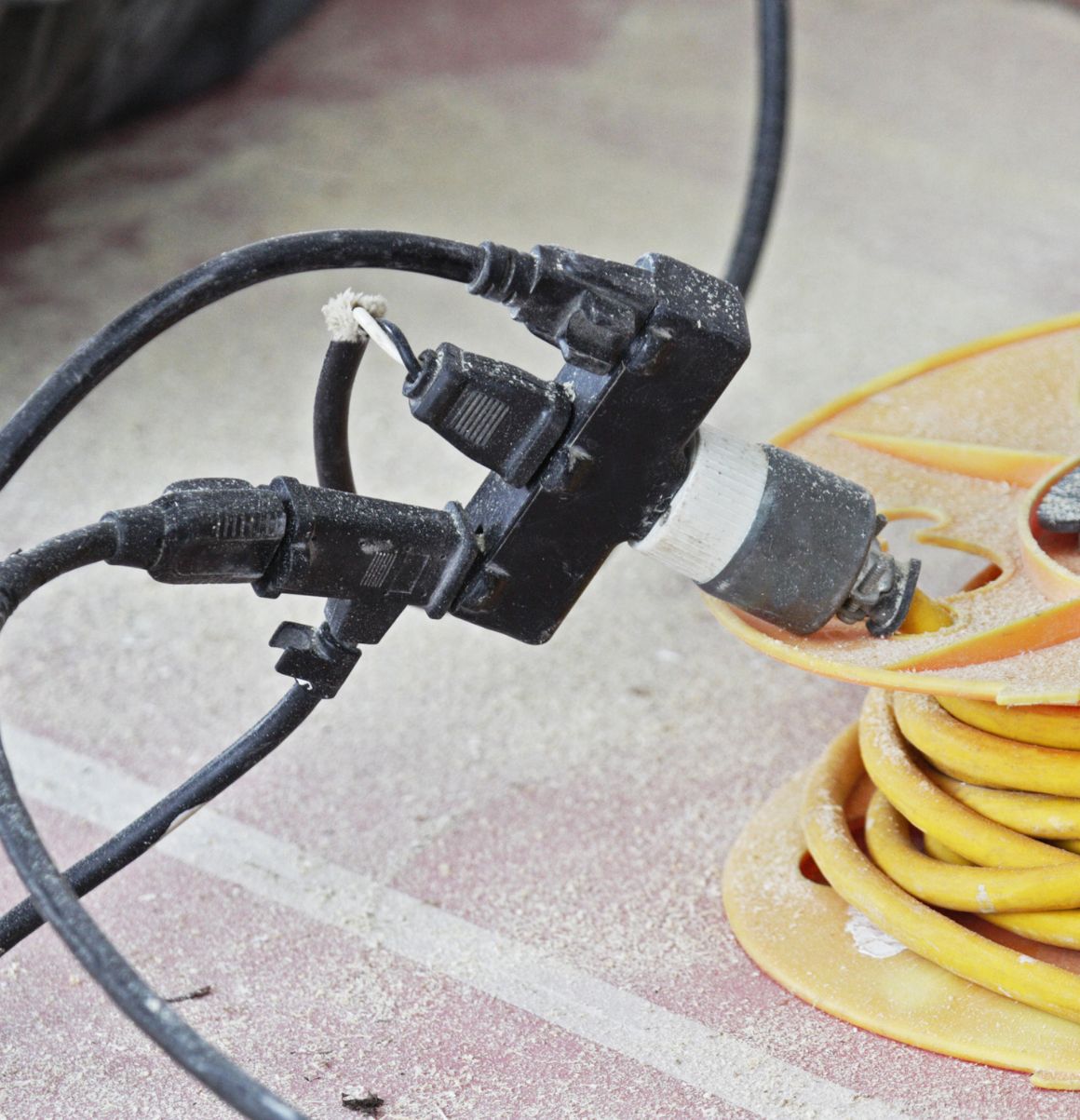
Improperly Installed Electrical Systems
While DIY projects can be rewarding, electrical work is not something to experiment with unless you’re qualified. Improperly installed electrical systems can lead to serious hazards like electrical fires and electrocution. Always hire a certified electrician for any electrical work in your home to ensure it is up to code and safely installed.
Room-Specific Hazards
Water and electricity make for poor bedfellows, and for this reason the three most dangerous areas of your home (electrically at least) include a mix of both!
Kitchen
- Appliances: Always unplug small appliances when not in use to minimize the risk of electrical fires. Take care not to overload outlets, as many kitchen appliances are electrically demanding.
- GFCI Outlets: Given the presence of water sources like the sink, ensure that outlets are equipped with Ground Fault Circuit Interrupters (GFCIs) to cut off power in case of a short circuit.
- Clutter: Counter space can get crowded. Overloaded outlets and cluttered areas increase the risk of accidents like knocking an appliance into a water source, creating a shock hazard.
Bathroom
- GFCI Outlets: Make sure all outlets are GFCIs to protect against electric shock.
- Appliance Use: Never use electrical appliances which plug into the wall, like hair dryers and curling irons, near water-filled sinks or bathtubs.
- Ventilation Fans: Ensure that exhaust fans are in good working condition to prevent moisture accumulation, which could damage your electrical systems.
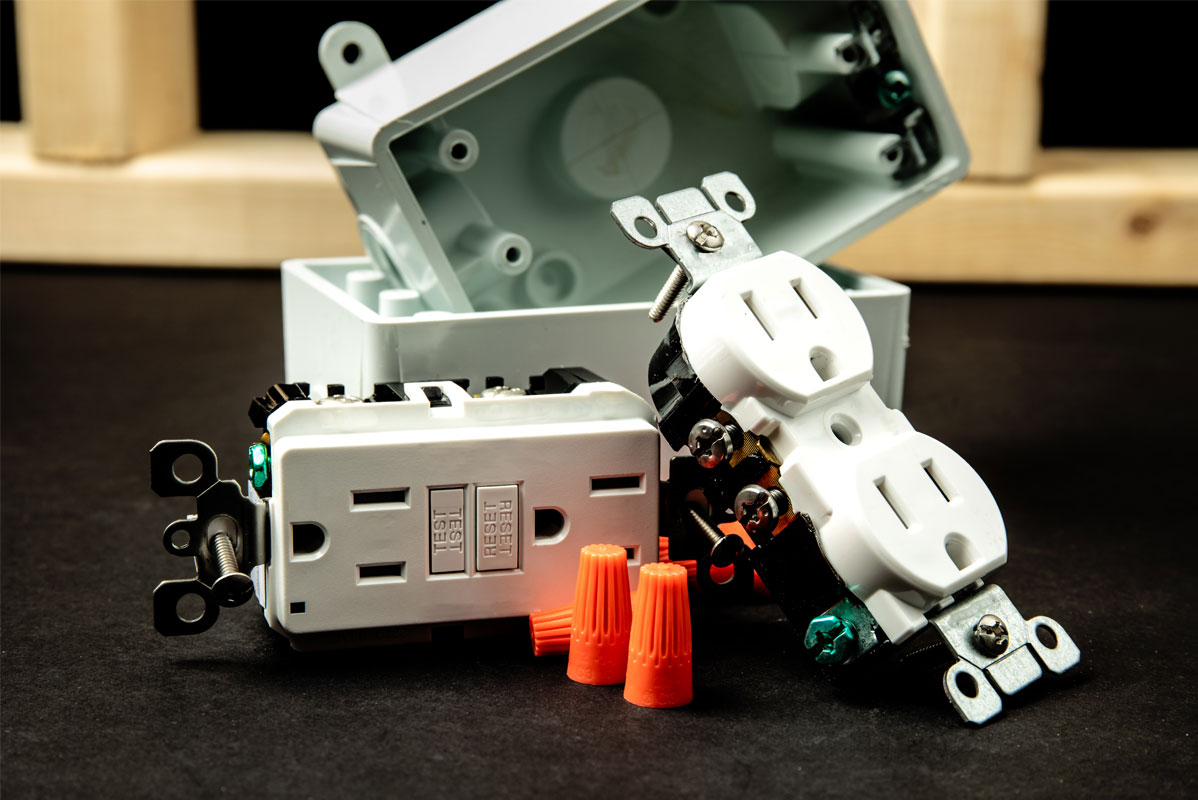
Garage and Outdoor Spaces
- Power Tools: Always store power tools unplugged and away from children’s reach. Check them for frayed cords or other signs of wear before each use.
- Outdoor Outlets: These should be covered and have GFCI protection to guard against the elements and potential shocks.
- Extension Cords: Most extension cords aren’t rated for use by high-current devices like table saws or space heaters. Use these with care and put them away unplugged when not using them.
Groups with Special Considerations
Children and Electrical Hazards
Young children are naturally curious, a trait that unfortunately makes them more susceptible to electrical hazards around the home. Follow these tips to ensure their safety:
- Use Outlet Covers or Tamper Resistant Receptacles: Use safety covers or install tamper resistant outlets on electrical outlets to prevent children from inserting foreign objects into them.
- Cord Management: Keep electrical cords out of reach and/or use cord organizers to minimize the likelihood of a child pulling an appliance off a shelf or counter.
- Appliance Safety: Always unplug appliances like toasters, kettles, and irons when not in use, and store them well out of a child’s reach.
- Educate: Teach older children the basics of electrical safety such as not touching electrical outlets and the dangers associated with water and electricity.
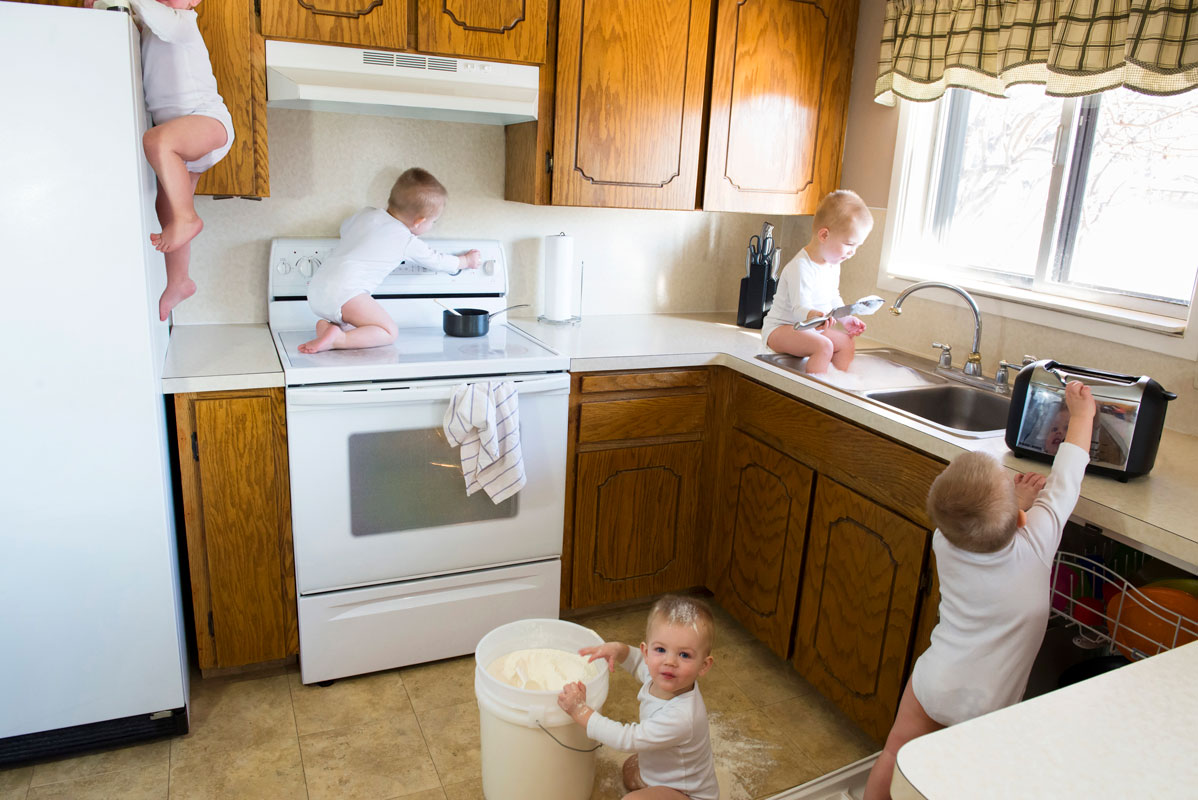
Elderly and Electrical Hazards
As people age, they may face mobility issues, reduced vision, and other challenges that make them particularly vulnerable to electrical hazards. Consider the following steps to enhance electrical safety for older adults:
- Well-Lit Spaces: Ensure that areas around electrical outlets, switches, and other electrical equipment are well-lit to minimize accidents caused by poor visibility. Consider installing motion-sensor activated light bulbs near stairwells and entryways.
- Clutter-Free Zones: Keep the areas around electrical outlets and power strips clutter-free to avoid accidental disconnections and avoid tripping hazards.
- Accessible Controls: Place electrical devices and their controls within easy reach so that elderly individuals do not have to stretch or bend, which could lead to accidents.
Preventative Measures & Safety Tips
Regular Inspections
The importance of regular electrical inspections cannot be overstated. Conducted by professional electricians, these inspections detect problems before they can escalate, and ensure that your home’s electrical system meets current safety standards.
Inspections should be performed before buying a new home, after major renovations, and generally every 10 years for newer homes or every 3-5 years for older homes.
Safe Practices
Everyday habits and practices play a significant role in electrical safety. Here are some tips for staying safe around electricity:
- Handle Plugs, Not Cords: When unplugging devices, pull out the plug rather than the cord to prevent wire exposure or fraying.
- Water Caution: As water conducts electricity, never handle wired electrical devices with wet hands or use them near water.
- Don’t Pour Water on Electrical Fires: Pouring water on an electrical fire can exacerbate the problem and expose you to electric shock. Instead, use an ABC rated fire extinguisher.
- Overloading: Avoid overloading electrical outlets and power strips, as this can lead to overheating and fires.
- Labeling: Clearly label all of the breakers and fuses in your electrical panel to make it easier to turn off power in an emergency.
- Install Smoke Alarms and Carbon Monoxide Detectors: All homes should be equipped with smoke alarms and carbon monoxide detectors. These devices save lives by alerting homeowners to the presence of fire, smoke, and odorless carbon monoxide.
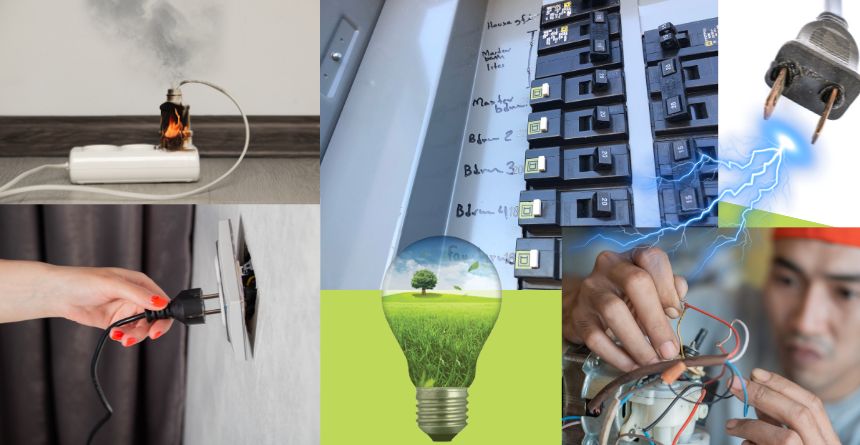
Avoiding Home Electrical Hazards
Staying safe around electricity doesn’t have to be challenging – and arguably modern technology has made our home’s wiring systems the safest they’ve ever been. However, a little bit of knowledge goes a long way to minimize those risks that remain.
Using extension cords correctly, operating circuits within their load rating, and using extreme care when working with electricity near water will help keep you and your family safe. All homes should have working smoke alarms and carbon monoxide detectors, and homeowners should have a licensed electrician perform routine electrical inspections to ensure that their electrical wiring remains safe and functioning.
Do you know the last time your home’s wiring was inspected? If not, now is a good time to have it checked so you can rest easy knowing that your property is safe.
